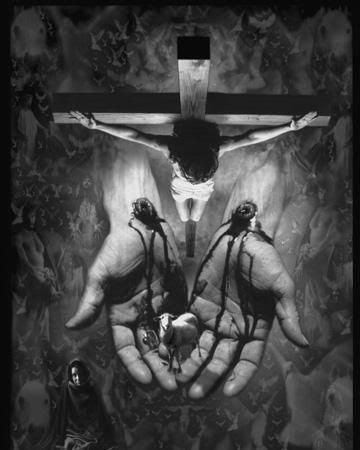
In the last few weeks, I have begun to explore the world of Christian Death Metal, Unblack Metal and so forth.
A friend commented that it must be something like tofu compared to a steak. A fair point, and one that shows the work that needs to be done in informing the secular world of the spirituality, power, and dread that accompanies the Christian faith.
In my earlier non-Christian days, I was a huge death metal fan: Morbid Angel, Obituary, Death, Carcass, Cannibal Corpse, Slayer, and so on. I left the scene once the whole "black metal" thing started, although I did like the first Emperor album. Much, if not all, of this stuff was satanic, or at least occult. Some was anti-Christian. In those days, this was not a problem. In fact
Demons attack with hatewas as good as it got for 18 year old me. The more satan was referenced with a death growl, the more I dug it.
Satan in the fires of hell awaits
Death against you all
God hear my death call
"Chapel of Ghouls" Morbid Angel Altars of Madness (1989)
Hankering for some heavy riffage recently sent me lurking back to these old gems. I still liked the music, but the lyrics were........off. And dumb.
A search began for Christian Death Metal. I found many great bands: Crimson Thorn, Mortification, Holy Blood.....



The great thing is, no heaviness or darkness is spared with the Christian message. Satan is mentioned in a death growl, but in terms of his destruction. Also, "Christ Jesus" sounds spectacular screamed. Many of the lyrics deal with the darker parts of Jesus life: the Passion, the Agony in the Garden. Mortification's "Envision Evangeline" is an eighteen minute epic that deals with the last hours of Jesus' life, told from the perspective of the evangelists.
Holy Unblack Metal is a new thing for me. Crimson Moonlight, Antestor, Horde. This stuff is insane: fast, brutal and incredibly Christian. Quite remarkable, considering Black Metal's full on satanism. In many ways, this stuff is even more subversive than the satanic bands. Brilliant.


What all this has led me to is that there is a longing within many young people to experience God, Jesus and the faith, but don't want it bland, secularized, homogenized or McDonaldsized. There is a real desire to experience something real and supernatural. Hillsong is not going to offer that, neither are fake healings and arena style evangelism.
What the church has neglected in the past twenty or so years is the intense spirituality and mysticism inherent with the Gospel message. It is not an accident that many of these bands reference the Eucharist. What this music, and the current interest in Christian mysticism are showing us is that there is genuine hunger for an experience of God; one that is real, unsanitised and wholly spiritual; not an overly sentimental cornfest that makes the Faith out to be the equivalent of, not tofu, but multi-national fast food.
Compare Horde with Hillsong, and you'll see what I mean.

